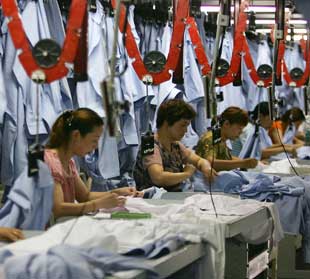 Quick research trip to the mall
Quick research trip to the mall
Policraticus and I went yesterday to a new outlet mall that recently opened outside of Houston just to check it out and to walk a little bit. We usually don’t go to malls, period, but sometimes you just happen to need clothes or something else, so we decided to go. We stopped by the Ann Taylor outlet store, because that used to be my favorite brand, but recently I have been reading that the brand has been having problems with sweat shops and child labor abroad and has not done much about it to resolve them; they seemed to have turned a blind eye to the problems. After reminding myself of that, we decided to make our mall visit a bit more fruitful, so we started checking out the labels on some of the clothes in the biggest stores at the mall to see where they were made. The countries that dominated the labels in all the stores were China, obviously, Vietnam, Cambodia, Thailand, Philippines, and India. Kenneth Cole and Calvin Klein had clothes made in Jordan, which was not a common country in the rest of the stores. The only store that had a piece of clothing made in the U.S. was Kenneth Cole and it happened to be only one dress in virtually the entire store. Reebok had soccer balls that stated on the side of the box that they were guaranteed to not be manufactured in Pakistan by children as it had (apparently) been the case traditionally. We did not go into the New Balance store, but we have learned that a quarter of the shoes they make are made in the U.S.
The UN Global Compact
I have done research for some time about which brands it would be ethical or “more” ethical to buy, but my findings have not been very clear or consistent. It seems that in 1998, a report by the National Labor Committee came out with sweatshop profiles that manufactured products for large U.S. corporations that caused a great uproar, but the internet search results seem pretty quiet after 2001. In my personal internet research, GAP Inc. comes across as the company that has done the most in terms of trying to ensure that human rights are not violated in their manufacturing facilities overseas, but given the lack of law enforcement in developing countries, who knows to what extent these efforts remain fruitful. Nike and Ann Taylor seem to have either delayed or taken no action whenever human right violations were discovered in their manufacturing facilities, but that information was as of 2007. I could not find much on these two companies that seemed definitive or more recent.
I did find out about the UN Global Compact, which is according to their website a “framework for businesses that are committed to aligning their operations and strategies with ten universally accepted principles in the areas of human rights, labour, the environment and anti-corruption. Companies who participate in the UN Global Compact do so in a voluntary manner and pledge more cooperation with international authorities and transparency in their business dealings with manufacturing facilities abroad. The UN Global Compact, however, is not a regulatory agency, so just because a company decides to participate in it, does not guarantee that human rights are not being violated. Regardless, I do think that since the participation in this UN framework is strictly voluntary, companies that do choose to participate in it show somewhat of a good will to clean their act in their operations overseas. Among some of the U.S. clothing companies that are currently participating in the UN Global Compact are: Gap Inc., Levi’s, Nike Inc., and Timberland.
The solution
I have not bought any clothes from Ann Taylor since I became more familiar with the labor issues the company tends to ignore. In fact, I have not bought anything from that brand ever since. Still, some of us have jobs that require us to wear a certain kind of clothing or you just need the clothes, period; thus, we need to buy clothes from somewhere. In my case, for instance, the problem is even worse, because I am a petite extra-small size, so the choice of brands for me is even narrower than for most women. Same goes for tall women and so on. Buying vintage or second-hand clothing is another option, but even if you go to Goodwill, the brands there are the same as those that you would buy in a department store. Another option would be to make your own or buy handmade clothes, but the latter option tends to be really expensive or, if you are like me and need a special size, then this option may not be very feasible. So, what to do? I really don’t know. I am still doing more research and trying to find more ethical options when shopping for clothes. I did find a fair trade clothing brand called Fair Indigo, which looks very nice; they also have jewelry and more. No Sweat Apparel is another option, but choices are rather limited. Other websites are: Pristine Planet, Marigold Fair Trade, and Peace of My Heart. Any others?
Here are some resources that I have found in the research I have done on the internet. Please feel free to share any other sites you are aware of:
- Behind the Label
- Made in USA
- Guide to Ending Sweatshops (Excellent and complete resource)
- Clean Clothes
- Business and Human Rights Resource Center
- UN Global Compact
















